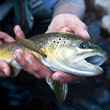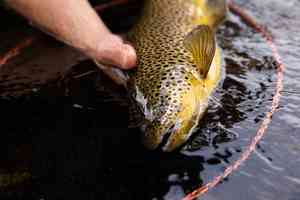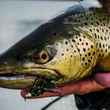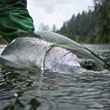I grew up far from the ocean so the only goliath I knew was the one David dropped with a slingshot. I don’t know how much that giant weighed on land, but the ocean beast with the same name tips nearly half a ton. Goliath grouper can live 40 years and can weigh 800 pounds. The one I’m looking at is less than half that size, but it’s still a lot of fish. Or a lot of fish to eat if that’s the side of the table you’re sitting on.
I saw a goliath grouper for the first time earlier this year. It was during a fishing trip off the Florida coast. I came up empty handed with flies, but live bait was working as I wrote in my story for Hatch. We had three hours to fish before my flight home and during that time, a goliath grouper ate the cobia, which had eaten the captain’s herring bait. All three surfaced in one fish. We wanted cobia, but got grouper with a gut full of cobia instead.
“That’s the circle of life right there. That’s what that is,” says Ryan Kane, Southern Instinct owner and guide. “It’s like you gotta get permission from goliaths to take anything from their reef.”
I still marvel at the size of the swimmer we released back in February. You can’t keep goliaths because they’re critically endangered. Goliath’s were nearly fished to extinction in the 1990s. I’m old enough to know the 90s and it seems too recent to be long enough for a rebound, but rebound is where grouper may be now. More goliaths in the Atlantic Ocean put people on opposite sides of the fishery.
“If you ask most fisherman, they say we need to get rid of the goliath,” Brice Barr, Key West Charter Fisherman’s Association president tells National Geographic. “These top predators are becoming so protected, they are starting to prey more and more on the rest of the fish.”
Fishermen claim their motorboats are goliath’s dinner bell and too many answer the call. Researchers say there’s not enough goliaths to warrant delisting.
“We’ve been trying to knock down these arguments for years,” says Chris Koenig, retired University of Florida marine biologist. “People think because it is big, it has to eat a lot.”
I don’t know grouper, but I know a bit about endangered species. I live, work and play in the land of endangered species in action. Reintroduced wolves and recovering grizzlies. Not to mention floundering salmon and the dam debate.
No matter the animal, the federal protection process is painful for some and productive for others. Humble ranchers lose livestock. Proud tourists call themselves wolfies. Avid hunters lose their lives in bear attacks. Eight-bear days in Yellowstone are eagerly bragged about. Wolves can be legally hunted in Idaho, Montana and Wyoming. Grizzlies, not yet. They’re still protected. As are goliath grouper. If they’re going to be fished, the newly rising sentiment of those who don’t want to catch them must also be considered.































Comments